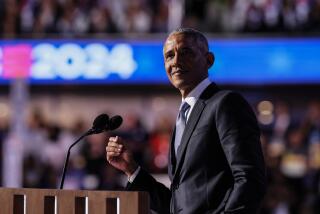In South Africa, Obama continues his focus on youth
JOHANNESBURG, South Africa — President Obama’s first audience of South Africans assembled Saturday in Soweto, and he recalled the protests that tore through the neighborhoods here in 1976, galvanizing the anti-apartheid movement.
The 51-year-old president was among the few in the room old enough to remember.
The town hall, packed with young people at the University of Johannesburg, was the latest in a series of international youth outreach efforts staged by the president. Obama’s foreign travel schedule these days can sometimes look like a globe-trotting college tour.
Nearly every presidential stopover includes a speech at a university auditorium, or if logistics demand, an off-campus venue filled with young faces. His weeklong tour through sub-Saharan Africa includes two events at South African universities; Obama will deliver another speech Sunday, at the University of Cape Town, where in the 1960s U.S. Sen. Robert F. Kennedy dramatically declared that world challenges require the “qualities of youth.”
“Don’t lose those qualities of youth,” Obama told the group of 650 young people at the Soweto forum. “Your imagination, your optimism, your idealism. The future of this continent is in your hands.”
For all the looking forward, Obama also spent a considerable amount of time looking back, as the nation’s iconic elder statesman Nelson Mandela lay critically ill in a Pretoria hospital.
Obama and First Lady Michelle Obama are not scheduled to visit the man who served as South Africa’s first black president, the White House said, but the Obamas spoke Saturday by phone to his wife, Graca Machel, who has maintained a vigil at his bedside. Obama later met with other family members at the Nelson Mandela Foundation headquarters.
“I expressed my hope that Madiba draws peace and comfort from the time that he is spending with loved ones, and also expressed my heartfelt support for the entire family as they work through this difficult time,” Obama said later, using Mandela’s clan name, as South Africans often do with affection. “I also reaffirmed the profound impact that his legacy has had in building a free South Africa, and in inspiring people around the world, including me.”
Obama’s outreach to the under-35 set serves a distinct purpose for a president trying to maintain his youthful image abroad and working to define his foreign policy legacy. The speeches often allow Obama to keep some distance from conflicts or sticky relationships with problematic national leaders. Instead, he offers brighter, but vaguer, notions of hope, calls for political engagement and investment in the future.
Obama also uses such events to send indirect messages to the leaders in question. Obama met Saturday morning with South African President Jacob Zuma, whose African National Congress — the party of Mandela — many observers say has lost its way. Zuma’s government is widely viewed as riddled with corruption and is under pressure to engage or lose the support of the next generation of South Africans.
Obama made no references to such issues at a news conference after their meeting. But a couple of hours later, he pointedly urged young people to “hold leaders accountable.”
Obama’s focus on the future is crucial to his strategy in Africa, where 1 in 3 people are between the ages of 10 and 24, and an estimated 60% of the continent’s population is younger than 35. Many live in dire poverty with poor nutrition, housing and schooling, conditions ripe for the political instability that has beset the continent.
The White House said Obama was working to nurture the next generation of African political leaders. It announced on Saturday a new fellowship program that it said would bring 500 young Africans to the United States each year for leadership training and mentoring. The effort is an extension of the Young African Leaders Initiative that Obama launched shortly after taking office.
It is far from clear whether such efforts, or eloquent speeches, will cement the president’s legacy with the next generation here.
Other foreign powers, including China, are pouring private investment into Africa, and U.S. influence has been waning. The young people in Soweto on Saturday appeared enamored of Obama’s image, although not his policies.
While the young people waiting for Obama at the town hall clapped and sang apartheid-era songs — changing the lyrics of one traditional Zulu song to “Obama is coming!” — the president also was asked detailed questions about his trade, foreign aid and counter-terrorism policies.
A group of young people who participated by videoconference from Nairobi, Kenya, questioned the president’s decision to skip their country — a longtime U.S. ally and homeland of Obama’s father — on his Africa tour in part because its democratically elected leaders are facing charges before the International Criminal Court. Obama, they said, appeared to be breaking a promise to visit Kenya during his presidency.
At one point in the proceedings, Obama appeared to acknowledge that the fruits of his public relations push would take years to appear.
“You guys are all going to do great things,” Obama said. “I’ll be retired by the time you do them.”
More to Read
Sign up for Essential California
The most important California stories and recommendations in your inbox every morning.
You may occasionally receive promotional content from the Los Angeles Times.











